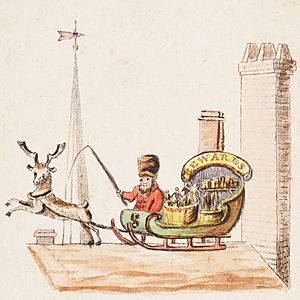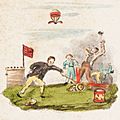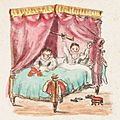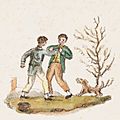Old Santeclaus with Much Delight facts for kids
"Old Santeclaus with Much Delight" is a special children's poem from 1821. It was published in New York and is very old! This poem is important because it was one of the first to talk about Santa Claus and his reindeer. It also showed pictures of Santa and his sleigh arriving on Christmas Eve. This was even before the famous poem "'Twas the Night before Christmas" came out!
Contents
How the Poem Was Published
This poem was printed in New York City in 1821. It came out as a small paperback book. The book was called The Children's Friend: A New-Year's Present, to the Little Ones from Five to Twelve.
Who Wrote and Drew It?
We don't know who wrote the poem or who drew the pictures. The book had eight colorful pictures. These pictures were made using a new printing method called lithography. This was actually the first time lithography was used in the United States!
Inspiring Other Stories
The poem might have inspired another famous writer, Clement Clarke Moore. He also lived in New York. Moore later wrote "'Twas the Night before Christmas". This poem helped create the modern Santa Claus we know today.
The Poem Itself
Here is the poem "Old Santeclaus with Much Delight":
Old SANTECLAUS with much delight
His reindeer drives this frosty night,
O’r chimney tops, and tracts of snow,
To bring his yearly gifts to you.
The steady friend of virtuous youth,
The friend of duty, and of truth,
Each Christmas eve he joys to come
Where peace and love have made their home.
Through many houses he has been,
And various beds and stockings seen;
Some, white as snow, and neatly mended,
Others, that seemed for pigs intended.
To some I gave a pretty doll,
To some a peg-top, or a ball;
No crackers, cannons, squibs, or rockets,
To blow their eyes up, or their pockets.
Where e’re I found good girls or boys,
That hated quarrels, strife and noise,
I left an apple, or a tart,
Or wooden gun, or painted cart;
No drums to stun their Mother’s ear,
Nor swords to make their sisters fear;
But pretty books to store their mind
With knowledge of each various kind.
But where I found the children naughty,
In manners crude, in temper haughty,
Thankless to parents, liars, swearers,
Boxers, or cheats, or base tale-bearers,
I left a long, black, birchen rod,
Such as the dread command of GOD
Directs a Parent’s hand to use
When virtue’s path his sons refuse.
Images for kids









